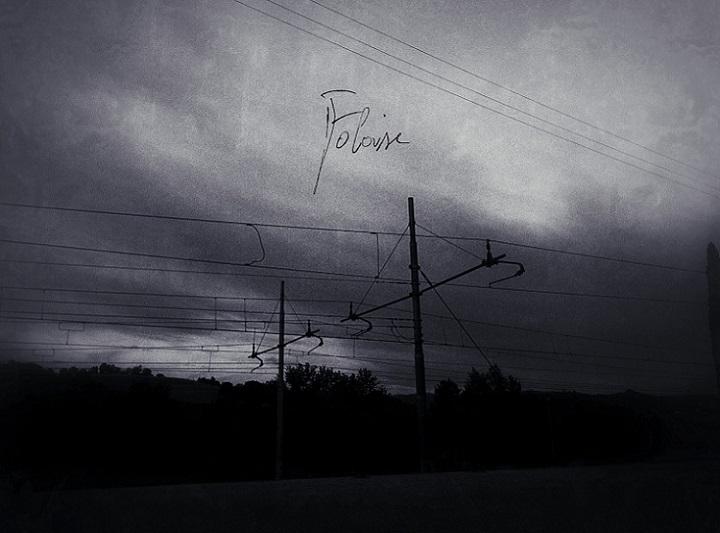Because black metal has splintered into so many directions, there are defined camps. Affinity for the seminal Norwegian old guard still exists; as does for first wave acts Bathory, Hellhammer, and Venom. Symphonic metal had its time and has been reduced to afterthought status, while French black metal and USBM are both odd and polarizing. Same bodes for the blackgaze movement, which has been popularized by Deafheaven, but perfected by An Autumn for Crippled Children and the band in focus, Italy’s Falaise.
The band’s As Time Goes By was originally self-released in 2015, only to be brought to the fore by the ATMF label. A whirling, if not decadent blend of black metal, shoegaze, and lush atmospheres, As Time Goes By displays a band whose maturity and songwriting know-how belies their relatively short time together as a unit, even though many of these songs have been in the works since 2012. Consisting of multi-instrumentalist/primary songwriter Lorenzo Pompili and vocalist Matteo Guarnello, Falaise is poised to become one of the next “it” bands in atmospheric black metal, which was plenty enough for us to connect with Pompili via email.
Dead Rhetoric: Falaise is certainly a new band, but by comparison, you sound more mature and refined than a lot of your peers. In your estimation, what gives the band its identity, even though you’re just on your first album?
Lorenzo Pompili: A first response, although shallow, is to say that what characterizes our music is having diversified listenings and seeking inspiration from where it is more spontaneous. The overall picture, however, is broader, because we think artistic identity, and not only strictly in music, is the willingness to create an honest work that reflects the truth not only about musical tastes, but about life, about feelings and ultimately represents, as far as possible, the “Id”, and explores what’s unconscious. This is especially true for a genre like black metal, which is meant to represent, avoiding superstructures, the most raw, most primal emotions, especially love and pain, subjects so recurring as they represent great experiences of self at the foundation of identity, both personal and artistic.
Dead Rhetoric: How long were you working on the songs for As Time Goes By? Were they something you always had in mind for a band like Falaise?
Pompili: We started writing songs in 2012, but we have focused in giving life to them only in the winter of two years later. It was a rather spontaneous process, the natural continuation of a musical and artistic path. The biggest flaw we now see is the mixing of the instruments, which could have been better, but being beginners we didn’t know much about it, we experimented.
Dead Rhetoric: As for As Time Goes By, you’ve already come to master the depressive black metal sound, but there are numerous bouts of melody. When writing a song, do you try to keep in mind that balance?
Pompili: The mix of aggressive and melodic parts it is not something we keep in mind consciously, but it is more of a spontaneous result. Eventually the desire to maintain a certain balance is more important in the album as a whole rather than in single songs, both the choice of pieces to use and in their order. We are not lovers of that black metal composed only by wicked riffs and aggression, but we are more attracted by the atmospheric and dreamy side of the genre.
Dead Rhetoric: The title track is simply a masterpiece. You don’t have very many long songs on the album, but this one is. Was it a challenge to put it together?
Pompili: True, we wanted to challenge ourselves with something bigger to contain all the features of our sound. Connecting all the atmospheric parts was not easy, especially because we wanted to create melodies that could touch the listener’s heart, so this took a bit of time.
Dead Rhetoric: Certainly you will be met with the debate over whether Falaise is a “true” black metal band or not. Is that of concern to you?
Pompili: Doing “true black metal” only because it is imposed by external factors, would actually be dishonest. Coherence lies in doing something “true” in the content, not in the form. In this sense, at the most, we can define us “true”. In our music we try to express all the kinds of influences that we listen to, we don’t care about how we are labeled.
Dead Rhetoric: You have already released a new song, “You Towards Me.” Is it an indication of the band’s future direction?
Pompili: The single is more similar to our traditional sound, but in the next album there will be also other influences (Lifelover, Lustre, etc.) which might not be so evident in our first work. We try to experiment with every new release. Moreover already in the single you can notice an improvement in the production and the care for the sounds.
Dead Rhetoric: Finally, what’s on your agenda for the rest of 2016?
Pompili: For the rest of the year we will focus on mixing the songs for the new album, which we have recently finished tracking; maybe we will release another single, we’ll see.


